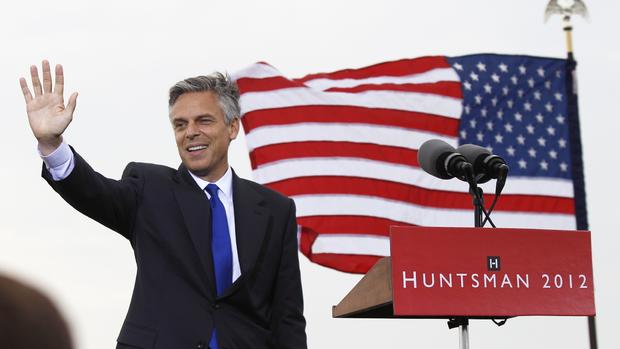Jon Huntsman: Does a "center right" presidential candidate have a prayer?
After sputtering out of the gate, Republican presidential candidate Jon Huntsman has found his voice as an unapologetic advocate for moderation in the crowded GOP field.
But the question remains: Do Republican voters really want moderation in 2012?
Huntsman made waves last week with a Tweet that read: "To be clear. I believe in evolution and trust scientists on global warming. Call me crazy." The Tweet was a response to comments by one of his rivals, Texas Governor Rick Perry, who has cast evolution as "just a theory" with "gaps" and suggested that global warming is a hoax perpetrated by scientists seeking financial backing.
The former Utah governor went further in an appearance that aired Sunday, suggesting that his Republican rivals (as well as President Obama) are on the political "fringes." Appearing on ABC's "This Week," Huntsman proclaimed himself a "center right candidate" for a "center right country" and suggested that Republicans have a "serious problem" if their party is "willing to shun science and become a party that - that was antithetical to science."
"When we take a position that isn't willing to embrace evolution, when we take a position that basically runs counter to what 98 of 100 climate scientists have said... about what is causing climate change and man's contribution to it, I think we find ourselves on the wrong side of science, and, therefore, in a losing position," said Huntsman.
Huntsman also went after Perry for suggesting an attempt by Federal Reserve Chairman Ben Bernanke to boost the economy ahead of the election would be "almost treasonous."
"I'm not sure that the average voter out there is going to hear that treasonous remark and say that sounds like a presidential candidate, that sounds like someone who is serious on the issues," Huntsman said.
On Rep. Michele Bachmann's claim that she will get prices under $2 per gallon, Huntsman said it was "completely unrealistic" and "we live in the real world."
And he generally cast Perry, Bachmann and much of the rest of the GOP field as too conservative to beat President Obama next November.
"I think when you find yourself at an extreme end of the Republican Party, you make yourself unelectable," Huntsman said.
Despite early inside-the-beltway buzz, Huntsman has struggled to gain traction among GOP primary voters. Political observers tend to attribute his inability to catch on in large part to the perception that he is a political moderate: Huntsman's positions on immigration, cap-and-trade legislation and gay rights, among other issues, have turned off many in the Republican base. And his decision to accept President Obama's offer to become U.S. ambassador to China makes him a hard sell to GOP voters who do not like Mr. Obama.
Huntsman's initially brushed off characterization of the candidate as a moderate, and he has taken pains to stress his conservative credentials, most notably at a June appearance before skeptical social conservatives in which he stressed his opposition to abortion rights. But apparently recognizing that Huntsman simply couldn't compete as a conservative, the campaign appears to have decided to embrace Huntsman's niche as a relative moderate in a field that often seems to be competing to show who can prove themselves furthest to the right.
After the ABC interview, Huntsman's campaign sent out a fundraising email spotlighting it and claiming "a significant spike in traffic to our website, more new followers on Twitter than any other candidate by far and a flurry of online donations." The campaign hopes that Huntsman's full-throated moderation will generate the sort of positive momentum that has thus far been difficult for the candidate to come by.
Yet it's a very open question whether a moderate candidate really has a shot to take the Republican presidential nomination in 2012. The two candidates in the field who have generated the most buzz, Bachmann and Perry, have played squarely to the far right. It's true that the frontrunner for the nomination, Mitt Romney, is distrusted by many conservatives over his record as Massachusetts governor, which included moderation on social issues and passage of a universal health care law. But Romney has shifted right in recent years and put considerable effort into courting conservatives, having apparently concluded that moderation is not a winning strategy for a Republican presidential candidate.
And Huntsman's decision to stand with science is not necessarily going to help. Last year, Pew found that a majority of Republicans do not believe there is solid evidence that the earth is warming. Polls in recent years have also shown that a majority of Republican voters reject the theory of evolution.
Which raises the question: Does Huntsman really have a path to the nomination? His campaign has essentially ceded Iowa, where social conservatives dominate the GOP electorate, to Huntsman's rivals. Huntsman is pinning its hopes in large part on New Hampshire, where independent voters can vote in the GOP primary and where fiscal issues tend to trump social ones. If Huntsman can somehow shock Romney in New Hampshire (which is right next to Massachusetts, and where Romney has a summer home), he could displace his fellow Mormon as the candidate who can make the strongest electability argument to GOP primary voters whose primary focus is to unseat Mr. Obama.
But that's a big if. Huntsman predicted Sunday that he would do well in New Hampshire and South Carolina and then "bring it home in Florida." He also cast his low poll numbers as nothing to worry about, arguing that voters haven't yet tuned in.
"I like exactly where we are," he said. "Stay tuned."

